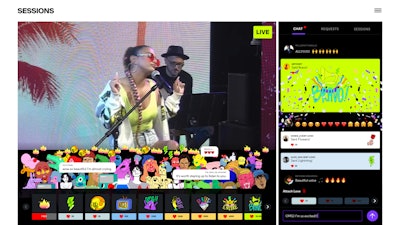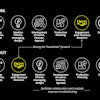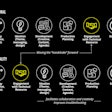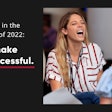
At the start of the pandemic, as event cancellations and venue shutdowns became commonplace, musicians and DJs were quick to embrace (if they hadn’t already) the virtual world, hosting listening parties via platforms such as Instagram and Twitch. But there was a sense that it was all just a band-aid solution until in-person events started up again. Fast forward several months later and the need for more dedicated platforms and virtual spaces is still very real.
Also, livestreamed events, especially those centered around music, involve certain challenges like royalties and monetization. Plus, just like in-person events, there’s the paperwork such as booking and scheduling, payment, and marketing.
 Skrachy, which is currently in beta, provides DJs with tools to monetize their business.Photo: Courtesy of Skrachy
Skrachy, which is currently in beta, provides DJs with tools to monetize their business.Photo: Courtesy of Skrachy
Cooper had worked in product management for several companies on IoT solutions, connecting home entertainment devices, smart cameras, and even swimming pools to cloud-based platforms. But it was his son’s makeshift DJ setup at his 18th birthday party that inspired him to use his corporate skills to build the entertainment platform. “I figured, why couldn’t I do this with a DJ? And thus Skrachy was born,” he says.
The platform’s DJ portal allows the user to set up an online storefront and set booking rates for various services including traditional in-person events, as well as virtual streaming events. DJs can also schedule their own virtual events and promote them on Facebook, Twitter, and Instagram using the “Campaign” feature.
The portal has a built-in e-commerce platform, an event calendar, and a full digital audio streaming platform. Listeners and event planners can book and access the livestreaming events using the Skrachy mobile app, where they can use the directory to find and book DJs from all over the world; they can then pay for the services directly via the Skrachy app, which is available for download on iOS and Android.
The platform uses a membership model for DJs that includes a basic plan costing $19.99 per month and a premium plan ($39.99 per month) that includes the DJ Console feature for livestreaming and the Campaigns feature for promoting and advertising events. (Currently, the beta trial period is free followed by a 30-day free trial for those who register after the beta period.)
Listeners can subscribe to the basic plan for $1.99 per month, which offers unlimited streaming, in-person and virtual event booking, and access to “Virtual Scheduled Events” from Skrachy DJs, while the premium plan costs $3.99 per month and includes all the features of the basic plan plus access to weekly “Featured Events” from top DJs around the world.
Before the COVID-19 pandemic and the shutdown of large in-person gatherings, live performances were how the majority. of musicians made most of their money. So it’s not surprising that companies and startups are building platforms that not only host virtual shows, but also help performers get paid.
For example, eMusic is partnering with 7Digital to launch eMusicLive, a “virtual concert and monetization platform,” and Rhapsody was acquired by immersive music performance startup MelodyVR, which streams shows that fans watch with virtual reality headsets. It’s also rumored that Spotify is developing a virtual event listings feature, similar to its concert discovery feature, that will suggest concerts to potential fans. Of course, Spotify isn’t in the business of selling tickets (yet).
 Ally Brooke performs during a show on Sessions.Photo: Jeffrey Nebolini
Ally Brooke performs during a show on Sessions.Photo: Jeffrey Nebolini
“We saw an opportunity to marry music with virtual gaming in such a way as to fundamentally alter the economic reality of musicians around the world,” Westergren says.
“Sessions is the first platform I’ve seen in my lifetime that has the ability to solve the two great intractable problems that have plagued performers for decades: building an audience and directly monetizing the fans. Hundreds of companies have tried, but there have always been fatal flaws that have prevented them from having this impact. And this includes Pandora, which I worked at for almost 20 years.” Westergren is the former CEO and founder of Pandora. He left in 2017 after, he told Fast Company, he felt the streaming service “got sucked into the music industrial complex vortex.”
Now back on track, so to speak, Westergren, along with Sessions co-founder and CEO Gordon Su, is hoping to put artists first once again. In order to join the platform, musicians need to apply; once accepted, they set up a profile and “Sessions handles the rest," Westergren explains. "We market every show and ensure that every performance is optimized for monetization through a wide array of techniques born of virtual gaming.”
He says that this large-scale promotion machine is what sets Sessions apart from other platforms. “Artists with very modest online fan bases are earning from $5,000 to $20,000 in a single show.” Using a proprietary growth engine, Westergren says that the platform is able to reach fans across all major social media platforms and hundreds of ad networks. “We partner with artists to exponentially increase their social reach and expand their footprint beyond their own networks to find fans across the web. And we offer this for every artist for every show, regardless of their scale and experience.”
For example, Icona Pop performed a live DJ set on Sessions on Aug. 14 to celebrate their new single. Fans were able to interact with the duo by asking questions, sending virtual gifts, and submitting song requests. Sessions provided paid marketing to drive millions of global impressions.
While there currently isn’t a method for planners to book artists for private events via the platform, fans are able to directly communicate with artists, and Westergren says he believes this will “create all sorts of additional opportunities.”
The impact of the pandemic on the event industry, and the entertainers who circulate within it, has brought to light the need for reform and innovation that will continue even after we’re allowed to gather in person again, so an investment in platforms like Sessions makes sense. “Artists have struggled forever to effectively build their own audience and create steady, reliable income streams. Touring and live performance, while a staple of musician’s careers, provide meaningful income for only a tiny sliver of performers,” Westergren says.
“The need for alternatives was there long before COVID and will be there long after. Already, artists are making far more in one 45-minute set on Sessions than they do selling out sizable venues in their home markets. If anything, Sessions will only enhance an artist’s live business, giving them a new global audience and a promotions platform of their own that they can use to bring awareness to live shows.”
Washington, D.C.-based DJ Hosea, who’s been DJing for over 20 years “the old-fashioned way,” is an early adopter of Skrachy, which allows him to now perform globally through the platform’s Virtual DJ Console. “I can spin events right from my basement to anyone in the world, and get paid for it. … [It’s] allowed me to create a new revenue stream with live online streaming events. I just hate that it didn’t come out years ago.”



















